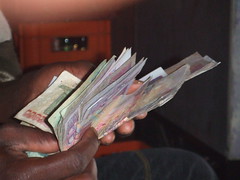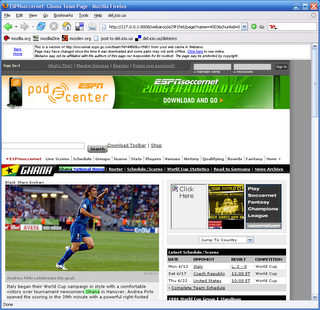In my last entry, I suggested that it was time for the average Ghanaian developer with an Internet connection to participate in the new web economy. I concluded that the main barrier to entry is a distribution network for the money being earned.
Today, I present to you an idea for a tropically tolerant money distribution network. 
The problem statement is this:
- Ghanaian banks do not make interbank transfers easy.
- Its really expensive to transfer money from outside the country.
- A good percentage of the population don't use banks
Whiles it is true that most Ghanaians do not use banks or have bank accounts, most Ghanaians have mobile phones. There is a joke that even the beggar at the stop light has at least two cell phones. The pervasiveness of mobile phone networks can be used as a tropical solution to the money distribution network.
Mobile phone operators have already established large cross-country distribution and payment systems. In order to establish a globally integrated payment network - there is a need to implement a system that connects say Paypal to the local mobile phone network. The implementer would have a Paypal account for incoming/outgoing international systems. On the ground in the tropics - there would be a need to implement and deploy a system that interacts with the mobile phone operators payment system and the Paypal API. The design / implementation should be minimally invasive to the already established mobile phone operators payment system. This will make it easier to create buy-in from the mobile phone operators.
To better illustrate my idea here is a use case:
The Characters:
Kofi Babone - a Ghanaian web designed based in Takoradi, Ghana.
Abrotsire Fashions - a Zambia owned clothing retailer in Canada
Shikatse - a Ghanaian company that implemented the system i am proposing.
Spacefon - a mobile phone operator in Ghana
Kofi Babone gets a job to design a website for Abrotsiri Fashions in Canada. Upon complention, payment is made to Shikatse's paypal account with a unique id for Kofi. Shikatse then credits Kofi's Spacefon account in Ghana with the money minus the paypal's commission, shikatse's commission and spacefon's commission. Shikatse's system notifies Kofi via an SMS text message that his money is available. Included with the text is an encrypted password. Kofi uses his personal password/key to decrypt this password and goes to the nearest Spacefon payment center. He presents the unencrypted password and he is given his money. He walks out with a smile and heads to the nearest akpeteshie bar.
Issues and Assumptions:
- Creating buy-in from the mobile phone operators
- Assumption that all payment centers are part of a wide-area-network(WAN).
- I haven't looked at Paypal's licensing policy
- Laws - there might be some laws that could prevent this
- Ease of integration with payment system
Thanks to Profit for the initial seed in this idea and to Paypal Mobile for the proof of concept.
 Tags: ghana, tropicallytolerant, payment network
Tags: ghana, tropicallytolerant, payment network

